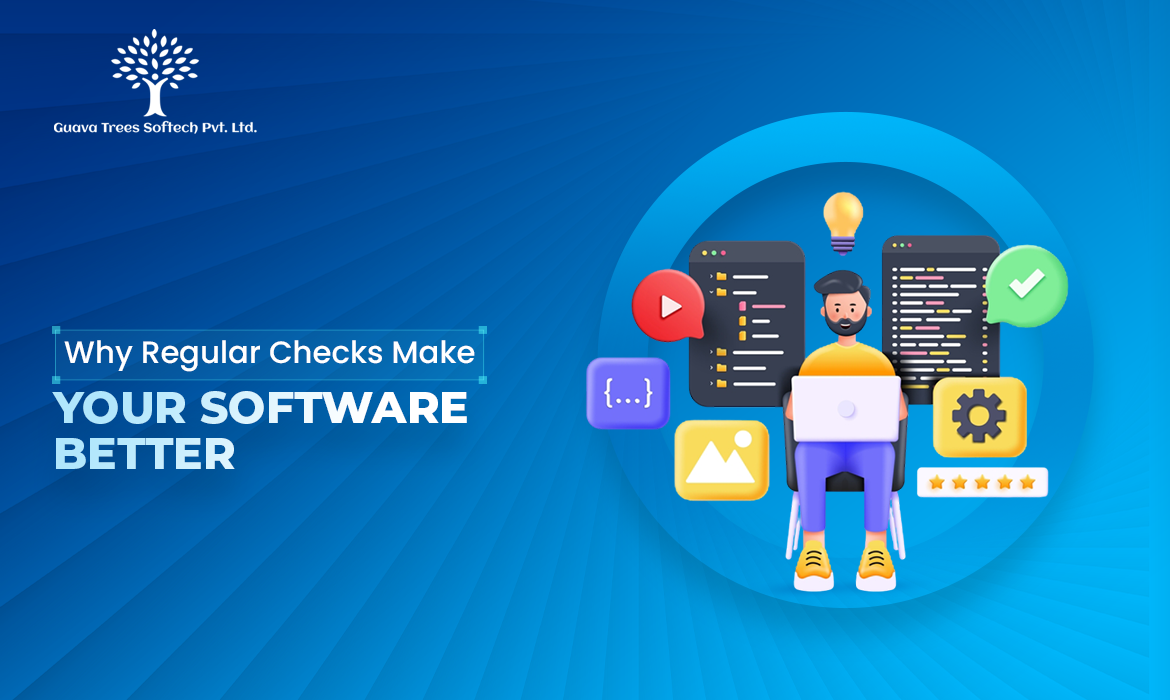In today’s fast-paced technology landscape, software is rarely static. User demands, security threats, and competitive pressures continuously evolve, forcing software systems to adapt. However, merely shipping new features or patching bugs is no longer sufficient. At Guava Trees Softech Pvt. Ltd, we believe regular checks, sometimes called software health checks or software audits, which are an essential practice that elevates the stability, performance, and security of your applications. Let’s break down why regular checks are a non-negotiable element of modern software engineering.
- Catching Bugs Early Saves Time And Money
One of the most compelling reasons to perform regular software checks is the opportunity to catch bugs early. Defects detected during development or early in staging environments cost significantly less to fix than those found after deployment. Studies from the Systems Sciences Institute at IBM show that fixing an error post-production can be up to 100 times more expensive than during the design phase.
By implementing a proactive testing regimen such as automated unit testing, integration testing and regression testing, the respective teams can quickly identify and fix errors before they snowball into customer-facing problems. In addition to traditional manual testing, leveraging CI/CD pipelines with automated test suites is a crucial part of modern, efficient software health checking.
- Security: Staying Ahead Of Vulnerabilities
The security landscape shifts daily. Zero-day exploits, third-party library vulnerabilities, or social engineering attempts can compromise your application and put sensitive user data at risk. Regular security audits, including vulnerability scans, code analysis, and penetration testing, can help you stay one step ahead of bad actors.
At Guava Trees Softech Pvt. Ltd, we recommend static code analysis tools like SonarQube or Snyk integrated into your CI/CD workflows. These tools automatically scan your codebase and dependencies for known security weaknesses. Moreover, periodic manual code reviews by experienced engineers bring human judgment to spot logic flaws that automated tools might miss.
- Maintaining Performance Under Pressure
Performance bottlenecks rarely reveal themselves in small-scale testing environments. Once your user base scales, even minor inefficiencies can result in latency spikes, timeouts, or infrastructure overload. Regular performance checks help your engineering team anticipate and mitigate these issues.
This includes activities such as:
- Load testingwith tools like JMeter or Locust
- Profilingapplication performance to identify slow database queries or memory leaks
- Infrastructure monitoringusing solutions like Prometheus and Grafana
By running these checks periodically, not just during launch you create a performance baseline and can spot degradations before they impact end users.
- Ensuring Compatibility Across Platforms
Modern applications must work across multiple browsers, operating systems, and devices. If you ship without regular compatibility testing, you risk alienating segments of your user base who might experience broken interfaces, inconsistent workflows, or outright application crashes.
Automated testing tools like BrowserStack or Sauce Labs allow for cross-platform checks at scale. Regularly validating against different environments ensures your software is accessible and reliable regardless of how your customers choose to access it.
- Reinforcing Code Quality And Technical Debt Control
Over time, even the best-designed software can accumulate technical debt—inefficient code, outdated libraries, or architectural decisions that no longer scale. Routine code reviews, static code analysis, and refactoring efforts help keep technical debt under control.
By scheduling code quality audits every quarter, for example, your team can identify:
- Dead or redundant code
- Outdated dependencies
- Inefficient algorithms
- Poorly documented modules
Controlling technical debt means your developers will spend less time fighting fires and more time building innovative features that deliver business value.
- Regulatory And Compliance Requirements
If your software handles sensitive data (health records, payment transactions, or personally identifiable information), you are most likely subject to compliance requirements such as GDPR, HIPAA, or PCI DSS. These regulations often mandate regular software security and data privacy checks.
Non-compliance can lead to steep fines and reputational damage. Building a schedule of compliance checks into your software development lifecycle is the best insurance against legal or regulatory surprises.
- Building User Trust
At the end of the day, software exists to serve people. Regular checks, updates, and improvements signal to your customers that you take their experience seriously. Stable, reliable, and secure software fosters user trust. In today’s market, trust is an invaluable differentiator and directly impacts customer loyalty and retention.
How Guava Trees Softech Pvt. Ltd Can Help
At Guava Trees Softech Pvt. Ltd, we understand that software success is not a one-time accomplishment but a continuous commitment. Our teams offer:
- Scheduled code audits
- Security vulnerability scanning
- Performance benchmarking
- Automated regression and cross-platform tests
- Compliance verification and documentation
Whether you need one-time health checks or ongoing maintenance support, our experts can design a program tailored to your technology stack and industry. We use the latest frameworks and best practices to ensure your applications stay performant, secure, and future-ready.
Conclusion
The cost of ignoring regular checks is simply too high. Performance slowdowns, security breaches, non-compliance, and technical debt can all erode the value of your software. Proactive, routine checks deliver far greater returns by making your software more robust, scalable, and trusted.
If you’re ready to level up your software’s quality and protect your users, let Guava Trees Softech Pvt. Ltd be your technology partner. Together, we can ensure that your software stays healthy, high-performing, and ahead of the competition.
Contact us today to explore a software health check program that fits your goals and budget.







